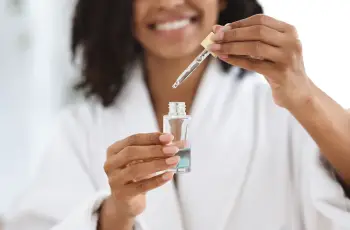
Benefits of Probiotics for Skin Care – Why are Probiotics Good for Skin?
Probiotic skincare products have been growing in popularity in recent years, and there’s no sign of this trend stopping anytime soon. You may already be aware of the benefits of good bacteria in alleviating bloating, stomach cramps, and other issues many of us suffer from, largely due to yogurt drinks that took the wellness world by storm in the late 90s.
It was only a matter of time before a slew of skincare products like cleansers, moisturizers, serums, and masks containing probiotics hit the market! Let’s take some time to delve into the world of probiotics to learn what they are and how they can help you and your skin glow.
What are Probiotics?
As mentioned earlier, probiotics are bacteria and yeasts that promote gut health. They are commonly found in yogurt and supplements, and can balance bacteria levels, keep pathogens in the gut at bay, and fight the aforementioned stomach issues, such as bloating. These properties can transfer to the skin. Using topical products can help alleviate skin issues by providing your face with a large population of good bacteria that promotes skin cell growth and skin health!
Our skin has a natural bacterial ecosystem, also known as the microbiome, which is an extremely important part of the skin and provides protection against harmful bacteria, pollution, and infection. In today’s modern world and our busy lifestyles, this ecosystem can often be disrupted, causing our skin to become drier, more stressed, and more sensitive than before. By incorporating probiotics into your skin care routine, you have the opportunity to restore the balance of the microbiome and skin barrier.
If we want to get all technical and more scientific, the correct definition of probiotics is that they are microorganisms that can benefit the host. This explains how we can get probiotics from plain forms of yogurt or supplements and apply them topically to benefit the skin.
There are two main strains of probiotics found in skin care formulas: Lactobacillus plantarum and Bifidobacterium longum. I don’t blame you if these words leave you speechless, but they are both very effective and beneficial to the skin’s ecosystem.
How do probiotics work?
Probiotics in skin care work on developing bacterial strains that are stable enough to be mixed into a formula. For example, when an ingredient called Lactobacillus ferment lysate filtrate is produced, it is done by stimulating Lactobacillus bulgaricus cells to secrete elements produced in response to stress. These are then isolated and added to skincare products to provide anti-aging and anti-inflammatory benefits to the skin. If you are still with me, I will explain to you the three main ways probiotics work for the skin:
Probiotics form a protective shield on the skin, preventing pathogenic microorganisms (bad bacteria) and free radicals from penetrating the skin and causing a response from the skin and its immune system.
They produce natural antibiotics called antimicrobial peptides that help fight harmful bacteria on the skin and in the environment.
Probiotics help strengthen the function of the skin, i.e. they fight against external skin damaging factors such as free radicals, the sun’s harmful UV rays, and daily aggressors such as pollution.
It is also worth noting that probiotics can support the skin barrier, microbiome (the natural bacterial layer on the skin), regulate pH, fight infection, boost the immune system and keep the skin plump, among other things. In the next section, we will explore why probiotics are so good for your skin.
Why are probiotics so good for your skin?
Over the years, we have become accustomed to using skincare products that make us feel “clean”, which often results in products containing antimicrobials that are too harsh on the skin in most cases and remove the bad bacteria from our bodies.
Now I want to tell you something fundamental, which is that we need these “bad” bacteria on our skin. For the skin to be at its healthiest, there must be a balance of 85% good bacteria and 15% bad bacteria. In order to maintain the balance of the natural ecosystem, both “good” and “bad” bacteria must be present on the skin at all times.
The skin’s microbiome, which is made up of trillions of different bacteria, has a very complex connection to the bacteria in our gut, proving that popular drinks and supplements like miso and kefir hold the healthy secret to a clear, beautiful complexion ahead. Not only do probiotics soothe irritated skin and restore the skin’s natural protective layer, they also protect the skin from the signs of aging.
What skin problems can probiotics help with?
Similar to calming and soothing the gut and any stomach issues, these benefits also apply to many skin issues and discomforts.
As topical probiotic research has evolved, various probiotic strains and extracts have been incorporated into skincare products, resulting in a wide variety of moisturizers, cleansers, masks, and more, all designed specifically to relieve skin concerns. This ensures that all skin types can find a product that works for them and their skin type.
Below are some examples of skin issues that have the most promise of being cured with the help of probiotics.
Rosacea
People with rosacea notice inflammation of the skin that leads to redness, primarily on the cheeks, nose, chin, and forehead. This rash is often accompanied by bumps and pimples, and can be very uncomfortable.
By using probiotics, redness is reduced, and the skin barrier is strengthened and soothed while the breakout is soothed. The burning and itching subsides, and the skin feels less dry and more comfortable.
Eczema
Similar to the soothing effects of rosacea, eczema can also be treated with the help of probiotics. Studies have found that using probiotics can reduce inflammation and discomfort. Topical products are great for soothing existing breakouts, while taking supplements can prevent future eczema patches from appearing.
Recent studies back this up, showing that pregnant women with a family history of eczema and similar conditions can prevent their newborns from suffering. Taking probiotics can be safe throughout pregnancy and for six months after birth, especially while breastfeeding, to reduce the chances of a baby developing eczema. Since there is evidence linking eczema in infants to good gut health, expectant mothers taking this supplement can promote a balanced and healthy gut and digestion, which over time has been linked to eczema in their children.
Anti-Aging
Since the skin is under the full force of aggressors every day, it’s understandable that our skin loses its youthful, healthy complexion too quickly. Especially considering we’re used to feeling “clean” by using harsher, more chemical-based products.
Probiotic formulas can fight these environmental aggressors that often lead to sensitivity, dullness, and premature aging!
While not fully proven, probiotics have been shown to boost collagen production in the skin, making the face more firm, plump, and radiant. When the face is dry, overexposed to the sun, and pollution causes inflammation and redness, the skin can look much older than it actually is. By incorporating probiotics into your skin care routine, you can undoubtedly reverse the signs of all of these factors.
What is the difference between prebiotics, probiotics and postbiotics?
It can be a bit overwhelming, but all three are vital to the skin microbiome.
Prebiotics – act as food/fertilizer that promotes the growth of microorganisms.
Probiotics – these are the microorganisms themselves.
Postbiotics – these are the fragments of dead bacterial cells that remain on the skin.
Prebiotics, probiotics and postbiotics make up this complex microbiome and ensure that the existing layer of microorganisms is maintained rather than simply replaced. The easiest way to prevent this is to avoid antibacterial products and instead choose non-skin creams and oil-based cleansers. Use plenty of moisturizer and avoid long, hot showers (even in the winter months, this feels great) as well as excessive skin exfoliation.
It’s time to give up the idea that “clear skin is the goal” because you’re unknowingly damaging your skin over time.
What skin types benefit from using probiotic skincare?
Generally speaking, all skin types can benefit from introducing probiotics into their skin care routine. The soothing, regenerative properties ensure that your complexion remains clear, pH balanced, and hydrated looking, among other things!
So, at some point, we need to start educating ourselves on the importance of our skin microbiome and say goodbye to the conventional products and their harmful, skin-drying formulas that we’ve become accustomed to. It’s time to get rid of the dirty mentality. Your skin will thank you!


